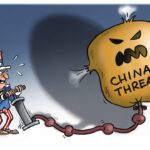China opposes the US’s overstretching the concept of national security and its discriminatory practices targeting particular countries and companies, said Lin Jian, spokesperson from China’s Foreign Ministry, on Thursday, noting that China will take resolute measures to firmly safeguard the legitimate and lawful rights and interests of Chinese companies.
The remarks came in response to a question asking for comments on a report by The Wall Street Journal stating that the US weighs a ban on China’s TP-Link Technology Co over national security concerns.
On the same day, China’s Ministry of Commerce spokesperson He Yongqian told a press conference that China has consistently opposed the US’ suppression of Chinese enterprises under the guise of national security. Relevant investigations of the US should be objective and rational, rather than making a presumption of guilt out of nothing.
According to The Wall Street Journal, an analysis from Microsoft published in October found that a Chinese hacking entity maintains a large network of compromised network devices mostly comprising thousands of TP-Link routers.
Investigators at the US Commerce, Defense and Justice departments have opened their own probes into the company, and authorities could ban the sale of TP-Link routers in the US next year, according to people familiar with the matter. An office of the Commerce Department has subpoenaed TP-Link, according to The Wall Street Journal.
The router-manufacturer TP-Link, established in China, has roughly 65 percent of the US market for routers for homes and small businesses. It is also the top choice on Amazon.com, and powers internet communications for the Defense Department and other federal government agencies, according to the report.
TP-Link stands out for its compatibility, safety and relatively low prices, making it highly competitive in the global market, Xiang Ligang, director-general of the Beijing-based Information Consumption Alliance, told the Global Times on Wednesday.
“Router technology is a relatively mature technology that has accumulated a great deal of experience over the years, in addition to improvements in efficiency and relevant standards. Accusations against a specific Chinese brand, ignoring other local and foreign brands, appear very targeted and discriminatory,” Zhou Mi, a senior research fellow at the Chinese Academy of International Trade and Economic Cooperation, told the Global Times on Wednesday, noting that it can be seen as another move that uses the guise of national security to suppress Chinese companies.
“If the US bans the TP-Link, it would limit choices for US consumers, potentially forcing them to pay higher prices for other brands that may be less competitive or advanced… This would not only increase costs for consumers but it might also heighten their vulnerability to cyberattacks,” Xiang said.











